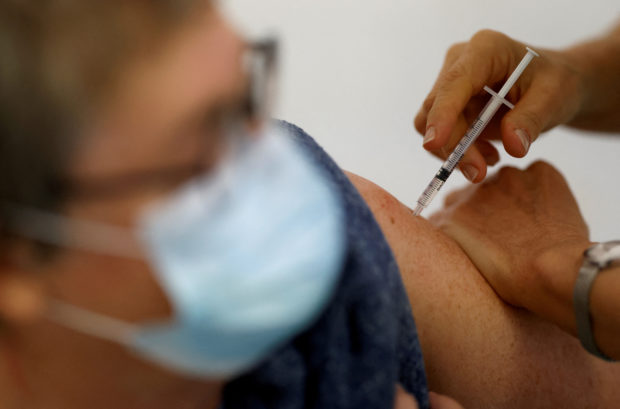Reinfection, severe outcome more common with Omicron BA.5 variant — research

FILE PHOTO: A medical worker administers a dose of the “Cominarty” Pfizer-BioNTech coronavirus disease (COVID-19) vaccine to a patient at a vaccination center in Ancenis-Saint-Gereon, France, November 17, 2021. REUTERS/Stephane Mahe/File Photo/File Photo
Compared with the earlier Omicron BA.2 subvariant, currently dominant Omicron BA.5 is linked with higher odds of causing a second SARS-COV-2 infection regardless of vaccination status, a study from Portugal suggests.
From late April through early June, researchers there studied 15,396 adults infected with the BA.2 variant and 12,306 infected with BA.5.
Vaccines and boosters were equally effective against both sublineages, according to a report posted on Monday on medRxiv ahead of peer review.
However, 10% of BA.5 cases were reinfections, compared to 5.6% of BA.2 cases, which suggests a reduction in protection conferred by previous infection against BA.5 compared to BA.2, the researchers said. Moreover, the vaccines appeared to be less effective in reducing the risk of severe outcomes for BA.5 compared with BA.2.
“Among those infected with BA.5, booster vaccination was associated with 77% and 88% reduction in risk of COVID-19 hospitalization and death, respectively, while higher risk reduction was found for BA.2 cases, with 93% and 94%, respectively,” the researchers wrote.
Article continues after this advertisementWhile “COVID-19 booster vaccination still offers substantial protection against severe outcomes following BA.5 infection,” they said, their findings provide “evidence to adjust public health measures during the BA.5 surge.”
Article continues after this advertisementVirus spike protein damages heart muscle cells
The spike protein on its surface that the coronavirus uses to break into heart muscle cells also triggers a damaging attack from the immune system, according to new research.
The SARS-CoV-2 spike protein interacts with other proteins in cardiac myocytes to cause inflammation, researchers also said during a presentation at the American Heart Association’s Basic Cardiovascular Sciences Scientific Sessions 2022.
In experiments with mice hearts, comparing the effects of SARS-CoV2 spike proteins and spike proteins from a different, relatively harmless coronavirus, the researchers found that only the SARS-CoV-2 spike protein caused heart dysfunction, enlargement, and inflammation.
Further, they found, in infected heart muscle cells only the SARS-CoV-2 spike interacted with so-called TLR4 proteins (Toll-like receptor-4) that recognize invaders and trigger inflammatory responses.
In a deceased patient with COVID-19 inflammation, the researchers found the SARS-CoV-2 spike protein and TLR4 protein in both heart muscle cells and other cell types. Both were absent in a biopsy of a healthy human heart.
“That means once the heart is infected with SARS-CoV-2, it will activate the TLR4 signaling,” Zhiqiang Lin of the Masonic Medical Research Institute in Utica, New York said in a statement.
“We provided direct evidence that spike protein is toxic to the heart muscle cells and narrowed down the underlying mechanism as spike protein directly inflames the heart muscle cells,” he told Reuters. “More work is being done in my lab to test whether and how spike protein kills heart muscle cells.”
RELATED STORY: